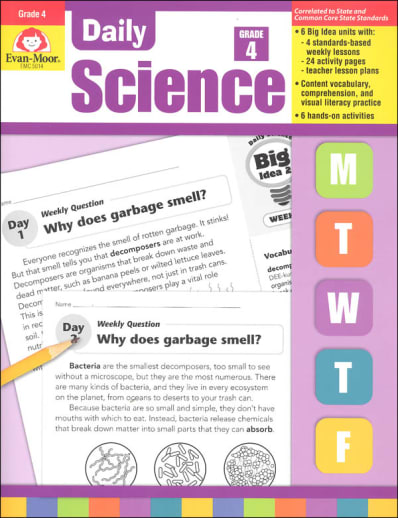The Grade Level Teacher Book provides Teacher pages, Student Activity pages that are reproducible (for one classroom), and an answer key. This course covers: interdependence of organisms and the environment; bacteria, mold and fungi; changing earth's surface (volcanoes and earthquakes, etc.); rocks and minerals; and how electrical energy coverts to other forms.
Daily Science Grade 4
Description
Fit standards-based science instruction into your curriculum!
Help your grade 4 students develop a genuine understanding of standards-based scientific concepts and vocabulary using the 150 engaging activities in Daily Science! A variety of rich resources, including vocabulary practice, hands-on science activities, and comprehension tests in multiple-choice format, help you successfully introduce students to earth, life, and physical science concepts.
30 weeks of instruction cover the following standards-based science topics:
Big Idea 1: Plants and animals depend on each other and on their environment for survival
Week 1: Why do beavers build dams?
Week 2: Why do some plants have fruit
Week 3: Do all bees make honey?
Week 4:Where do animals get food in the winter?
Week 5: Unit Review
Big Idea 2: Most microorganisms do not cause disease, and many are beneficial
Week 1: Why does garbage smell?
Week 2: How do bacteria create cavities?
Week 3: Are all germs bad?
Week 4: Is it safe to eat moldy food?
Week 5: Unit Review
Big Idea 3: Both slow and rapid processes - from erosion to earthquakes - shape and reshape the Earth's surface
Week 1: How was the Grand Canyon formed?
Week 2: Do glaciers really move?
Week 3: What makes volcanoes erupt?
Week 4: What causes earthquakes?
Week 5: Unit Review
Big Idea 4: The properties of rocks and minerals reflect the process that formed them
Week 1: What's the difference between a rock and a mineral?
Week 2: Where do rocks come from?
Week 3: Are some rocks valuable?
Week 4: Do all rocks come from Earth?
Week 5: Unit Review
Big Idea 5: Electrical energy can be converted into heat, light, sound, and motion
Week 1: How do toasters work?
Week 2: What lights a digital clock?
Week 3: How do hearing aids help people hear?
Week 4: How do electric cars work?
Week 5: Unit Review
Big Idea 6: People invented machines to make work easier
Week 1: Why do some building entrances have ramps?
Week 2: What's the difference between a nail and a screw?
Week 3: How do elevators work?
Week 4: How does a wheelbarrow make works easier?
Week 5: Unit Review
Providing daily supplemental activity pages for elementary to early middle school, this Evan-Moor series reinforces scientific knowledge, reading comprehension and vocabulary development. Short, 10-15-minute activities organized around reading passages are easy to implement and schedule into your educational day.
Organized into 6 topical Big Ideas Units each investigating a question from life, earth, or physical science and based on state standards. Each Unit is 5 weeks long, with Weeks 1-4 providing teaching on the key information. Weekly lessons begin with a Teacher Page that provides additional information and activity ideas. Student Activity pages follow. Days 1-4 include a variety of writing, comprehension, vocabulary, critical thinking, visual literacy, oral language practice or hands-on activities. Day 5 is review. Week 5 is considered a Unit review with comprehension questions, visual literacy activity, vocabulary review and a hands-on activity related to the previous 4 weeks. From a secular publisher, there is evolutionary content. ~ Deanne
The Grade Level Teacher Book provides Teacher pages, reproducible (for one classroom) Student Activity pages, and an answer key. 192 pgs. pb
The Student Practice Book (Student Workbook) provides only the Student Activity pages. This book is not reproducible and does not include the answer key. It is designed to be used with an additional student or instead of copying the Student pages from the Teacher book.
| Product Format: | Paperback |
|---|---|
| Grade: | 4 |
| Brand: | Evan-Moor |
| ISBN: | 9781596739284 |
| EAN/UPC: | 023472050144 |
| Length in Inches: | 10.875 |
| Width in Inches: | 8.5 |
| Height in Inches: | 0.4375 |
| Weight in Pounds: | 1.0625 |

